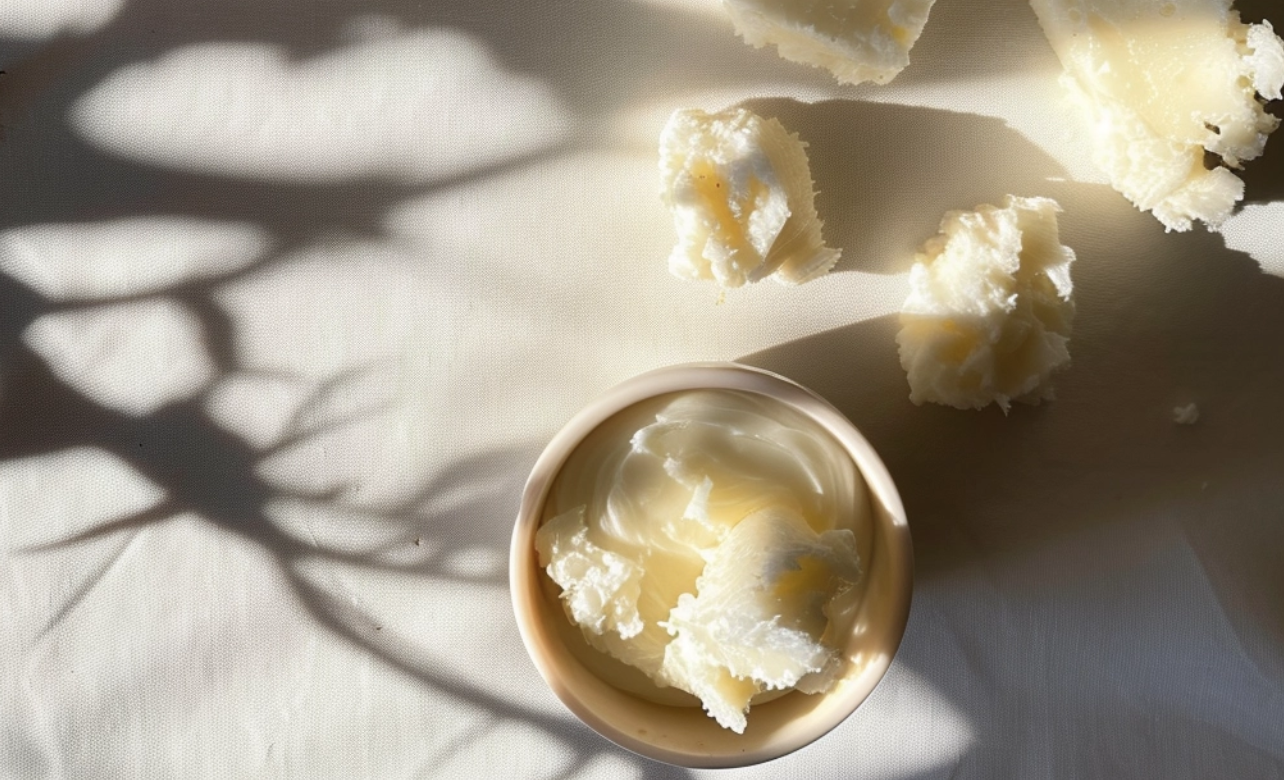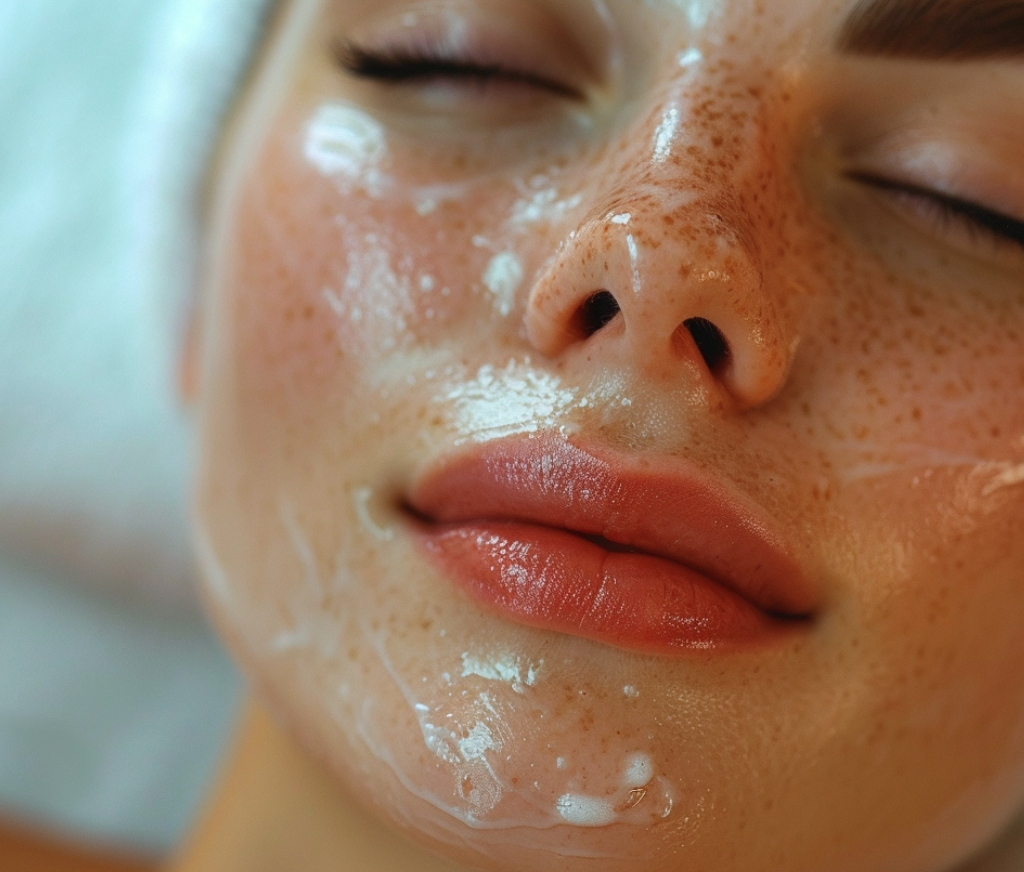Have you ever heard of coconut oil’s magic touch? Not only is it delicious in cooking, but it’s also a treasure trove of benefits for your skin!
Coconut oil has long been cherished for its myriad health benefits, both inside and out. Beyond its culinary uses, coconut oil has gained popularity as a skincare staple, particularly when used in facial massage routines.
But wait, there’s more! With different types of coconut oil available, it can get confusing. Don’t worry, we’ll keep it simple! Think of it like this: there’s pure, unprocessed coconut oil, and there’s coconut oil that’s been refined for cooking. We’re focusing on the natural, unrefined kind, packed with all the good stuff to pamper your skin.
So, why is coconut oil so great for your face? It’s all about those amazing ingredients! Rich in saturated fats and medium-chain fatty acids (MCFAs), coconut oil nourishes and moisturizes the skin, promoting a healthy complexion and a radiant glow. Lauric acid, comprising almost half of coconut oil’s composition, offers antimicrobial properties that can benefit skin health. Additionally, other fatty acids present in coconut oil contribute to its soothing and protective effects on the skin.
Ready to dive into the world of coconut oil face massages?
Composition of coconut oil
Coconut oil is a rich source of fat, comprising 100% fat content, with a predominant portion being saturated fat, ranging from 80-90%. This oil is abundant in medium-chain fatty acids (MCFAs), contributing to its unique composition. Among its fatty acid profile, lauric acid constitutes nearly half at 49%, followed by myristic acid at 20%. Additionally, it contains palmitic acid (7%), capric acid (6%), caprylic acid (9%), oleic acid (4%), stearic acid (3%), linoleic acid (2%), and caproic acid (1%). This comprehensive blend of fatty acids makes coconut oil a valuable component with various health benefits.

| Fatty Acid | Percentage | Potential Benefits |
|---|---|---|
| Lauric Acid | 49% | Potential antibacterial and antiviral properties |
| Myristic Acid | 20% | Contributes to solid texture |
| Palmitic Acid | 7% | Provides structure and stability |
| Capric Acid | 6% | Potential antimicrobial properties |
| Caprylic Acid | 9% | Easily absorbed by the body |
| Oleic Acid | 4% | Monounsaturated fat with potential health benefits |
| Stearic Acid | 3% | Provides structure and stability |
| Linoleic Acid | 2% | Essential fatty acid |
| Caproic Acid | 1% | Potential antimicrobial properties |
Benefits Of Applying Coconut Oil Massage On Face
Coconut oil: it’s not just for cooking anymore! This tropical treasure trove boasts a wealth of benefits, and your skin can reap the rewards too. Wondering if applying coconut oil on your face overnight is a good idea? Let’s dive into the potential benefits and help you decide if it’s the missing piece in your beauty routine.
1. Prevent Skin from Damaging by Microorganisms:
Coconut oil possesses powerful antimicrobial properties, thanks to its high content of lauric acid. When applied to the skin overnight, coconut oil forms a protective barrier, defending against harmful microorganisms that can lead to infections, breakouts, and skin irritations.
2. Moisturizing Properties:
One of the most notable benefits of coconut oil is its exceptional moisturising properties. Rich in fatty acids, coconut oil penetrates deep into the skin, replenishing moisture and restoring hydration levels. For those with dry or dehydrated skin, overnight application of coconut oil can provide much-needed relief and promote a soft, supple complexion.
3. Treatment for Acne:
Contrary to popular belief, coconut oil can be a beneficial treatment for acne-prone skin. Its antimicrobial and anti-inflammatory properties help to combat acne-causing bacteria while soothing inflammation and reducing redness. By applying coconut oil on the face overnight, you can effectively target existing breakouts and prevent future flare-ups.
4. Natural Healing:
Coconut oil is known for its ability to support the skin’s natural healing process. Whether dealing with minor cuts, scrapes, or insect bites, applying coconut oil overnight can accelerate the healing process, thanks to its nourishing and regenerative properties.
5. Reduces Inflammation:
Inflammation is a common culprit behind many skin issues, including acne, eczema, and rosacea. Coconut oil contains anti-inflammatory compounds that can help soothe irritated skin and reduce redness and swelling. By applying coconut oil overnight, you can calm inflammation and promote a more balanced complexion.
6. Promotes Even Skin Tone:
Uneven skin tone and hyperpigmentation can detract from the appearance of healthy skin. Coconut oil contains antioxidants and vitamins that help to promote cell turnover and fade dark spots, resulting in a more even and radiant complexion over time.
7. Reduces Signs of Ageing:
As we age, our skin naturally loses elasticity and firmness, leading to the formation of fine lines and wrinkles. Coconut oil is rich in antioxidants, which help to combat free radical damage and prevent premature ageing. By applying coconut oil on the face overnight, you can nourish the skin, boost collagen production, and reduce the appearance of fine lines and wrinkles.
In conclusion, the benefits of applying coconut oil on the face overnight are undeniable. From defending against harmful microorganisms to promoting healing, reducing inflammation, and combating signs of ageing, coconut oil offers a holistic approach to skincare that can transform your complexion. Incorporate this natural elixir into your nightly skincare routine and wake up to a refreshed, rejuvenated, and radiant complexion every morning.
Read Also - Calories in Cream Bun
How you can use coconut oil for your face
Incorporating coconut oil into your skincare routine can work wonders for your complexion. Here’s how you can harness the magic of coconut oil for your face:
- Massage Your Skin: Warm a small amount of coconut oil between your palms and gently massage it onto your face using circular motions. This helps improve blood circulation, promoting a healthy glow and reducing tension in facial muscles.
- As a Body Scrub: Mix coconut oil with natural exfoliants like sugar or salt to create a luxurious body scrub. Apply the mixture to damp skin, gently massaging in circular motions to slough away dead skin cells and reveal smoother, softer skin.
- As a Makeup Remover: Coconut oil’s natural emollient properties make it an effective makeup remover. Apply a small amount of oil to a cotton pad and gently wipe away makeup, including stubborn eye makeup and waterproof mascara, leaving your skin clean and nourished.
- As a Face Mask: Treat your skin to a hydrating coconut oil face mask. Combine coconut oil with ingredients like honey, yogurt, or mashed avocado to create a luxurious mask that deeply nourishes and moisturises your skin. Leave on for 10-15 minutes before rinsing off with warm water.
Read Also - Does Creatine Cause Constipation?
Step by Step Process To Apply Coconut Oil Massage On Face?
Applying coconut oil to your face is a simple and effective way to nourish and moisturize your skin. Here’s a step-by-step process to help you get started:

1. Choose High-Quality Coconut Oil: Select organic, virgin coconut oil for the best results. Look for unrefined and cold-pressed varieties to ensure maximum nutrient retention.
2. Cleanse Your Face: Start by washing your face with a gentle cleanser to remove any dirt, makeup, or impurities from your skin. Pat your face dry with a clean towel.
3. Warm the Coconut Oil: Scoop out a small amount of coconut oil using clean fingers or a spoon and place it in the palm of your hand. Rub your hands together to warm the oil until it melts into a liquid consistency.
4. Apply to Your Face: Gently massage the melted coconut oil onto your face using circular motions. Start from the center of your face and work your way outwards, focusing on areas that tend to be drier or more prone to fine lines and wrinkles.
5. Massage Your Face: Take a few extra minutes to massage the coconut oil into your skin using upward and outward strokes. This helps improve blood circulation, promote lymphatic drainage, and enhance absorption of the oil into your skin.
6. Pay Attention to Problem Areas: If you have specific skin concerns, such as dry patches or acne-prone areas, be sure to apply a bit more coconut oil to these areas and gently massage until absorbed.
7. Leave On or Rinse Off: Depending on your preference and skin type, you can choose to leave the coconut oil on your face as a moisturiser or rinse it off after 10-15 minutes. If leaving it on, allow the oil to fully absorb into your skin before applying any other skincare products or makeup.
8. Repeat as Needed: You can apply coconut oil to your face once or twice daily, depending on your skin’s needs. It’s especially beneficial to use coconut oil as part of your nighttime skincare routine to allow it to work its magic while you sleep.
9. Store Properly: Store coconut oil in a cool, dry place away from direct sunlight to prevent it from melting or becoming rancid.
Additional Tips: Use lukewarm water when cleansing your face. Avoid using coconut oil if you have very oily or acne-prone skin. If you experience any irritation, discontinue use immediately. Consult a dermatologist before using coconut oil on your face, especially if you have any underlying skin conditions.
Remember, everyone’s skin is different, and what works for one person might not work for another. Be mindful of your skin’s reaction and adjust the application as needed. Enjoy exploring natural skincare options, but always prioritise the health and well-being of your skin!
REFERENCE – https://www.hsph.harvard.edu/nutritionsource/food-features/coconut-oil/
Read Also - Dead Sea Mud Benefits







